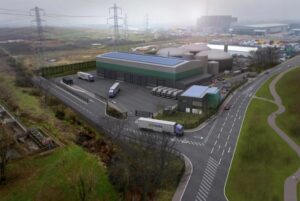SUEZ seeks permission for AD facility in Croydon, South London

If approved, the AD at Beddington Lane will aim to create reliable, renewable gas – enough to supply up to 8,200 homes – while reducing CO2 emissions and improving the UK’s energy security by putting food waste to good use.
The company is set to start a pre-application consultation with local communities about the plans for the site, which is currently vacant, and is already allocated for waste use in the South London Waste Plan.
SUEZ has already received planning permission for a waste transfer and processing facility, capable of processing 350,000 tonnes of waste a year, on this site.
SUEZ proposes to develop an AD plant, rather than the current facility, which is located at 79-85 Beddington Lane.
The AD facility would generate renewable energy, process 70% less waste than the consented facility and result in 50% less traffic compared to the consented scheme, according to the company.
It added that the plans aim to help food waste generated by homes and businesses to be processed in the most environmentally friendly way possible.
If approved, construction of the proposed AD facility would begin in 2024/25 and aims to create around 40 temporary jobs.
The plant would then become operational in 2025/26, creating up to 21 permanent jobs.
Before the planning application is submitted, SUEZ is “keen to engage with local communities and their representatives” to get feedback on the plans.
Members of the public are also invited to attend drop-in sessions at St. Mary’s Church in Church Road, on Tuesday 18 July between 1pm – 8pm and Wednesday 19 July between 10am – 4pm.
There will also be the chance to give feedback in person and online before the consultation closes on Thursday 31 August.
Tim Hughes, project development manager, SUEZ recycling and recovery UK, said: “We need alternative renewable energy sources to help respond to the climate emergency and rising energy costs. Anaerobic digestion is an excellent method of energy generation because it recycles food waste and generates reliable, renewable energy at the same time. Government policy changes around food waste collection and processing mean that London, just like the rest of the UK, is ultimately going to need a network of treatment facilities across the city to process its food waste.
“We believe this site is an ideal place to develop this anaerobic digestion facility because it is earmarked as a site for a waste treatment facility by the South London Waste Partnership.
“We already have planning permission for a waste processing facility on site which would deal with more than three times the volume of waste we are proposing to manage in the anaerobic digestion facility, and there are established suitable traffic routes to other facilities in the area.
"Consulting and engaging with local communities is important, and we’re looking forward to having discussions with local communities and their representatives and receiving feedback on the plans over the coming weeks.”
The plans can be found here.


























